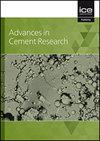Rheology of cement-sodium silicate grout containing bentonite and cellulose ether at high temperatures
IF 1.3
4区 工程技术
Q3 CONSTRUCTION & BUILDING TECHNOLOGY
引用次数: 1
Abstract
Cement-sodium silicate (C-S) grout is widely used to control water inrush disasters, and its apparent viscosity considerably impacts its water-plugging effect. However, the traditional grouting materials and methods are inappropriate for high-temperature environments, as high temperatures can affect the grout viscosity. Viscosity-modifying admixtures (VMAs) are used to thicken the grout and increase its apparent viscosity. In this study, two types of bentonite (calcium bentonite, Ca-B, and sodium bentonite, Na-B) and hydroxyethyl methyl cellulose (HEMC) were used to modify the C-S grout, and laboratory tests to evaluate fluidity, gelation time, and rheology were performed. The results showed that both bentonite and HEMC decreased fluidity and prolonged gelation time. HEMC, Ca-B, and Na-B decreased fluidity by 46.8–60.4%, 12.5–31.5%, and 17.7–39.1%, respectively, at different temperatures. HEMC, Ca-B, and Na-B increased gelation time by 23.8–50.1%, 23.3–71.4%, and 20%–57.1%, respectively. Additionally, bentonite can partially resist high temperatures and improve the apparent viscosity of grout owing to its water-absorption capacity. Conversely, HEMC has a negative effect on apparent viscosity, which is attributed to the formation of a complex microstructure resulting from intermolecular crosslinking between the cement particles and HEMC, preventing the connection of sodium silicate.含膨润土和纤维素醚的水泥-硅酸钠浆液的高温流变性
水泥-硅酸钠(C-S)浆液被广泛用于防治突水灾害,其表观粘度对其堵水效果有很大影响。然而,传统的注浆材料和方法不适合高温环境,高温会影响浆液粘度。黏度改性外加剂(vma)用于增稠浆料,提高浆料的表观黏度。在这项研究中,使用两种类型的膨润土(钙膨润土,Ca-B和钠膨润土,Na-B)和羟乙基甲基纤维素(HEMC)对C-S浆液进行改性,并进行了实验室测试,以评估流动性、凝胶时间和流变性。结果表明,膨润土和HEMC均降低了凝胶的流动性,延长了凝胶时间。在不同温度下,HEMC、Ca-B和Na-B分别降低了46.8 ~ 60.4%、12.5 ~ 31.5%和17.7 ~ 39.1%的流动性。HEMC、Ca-B和Na-B分别使凝胶时间延长23.8% ~ 50.1%、23.3 ~ 71.4%和20% ~ 57.1%。此外,膨润土由于吸水能力强,可以部分抵抗高温,提高浆液的表观粘度。相反,HEMC对表观粘度有负面影响,这是由于水泥颗粒与HEMC之间的分子间交联形成了复杂的微观结构,阻止了水玻璃的连接。
本文章由计算机程序翻译,如有差异,请以英文原文为准。
求助全文
约1分钟内获得全文
求助全文
来源期刊

Advances in Cement Research
工程技术-材料科学:综合
CiteScore
3.70
自引率
5.00%
发文量
56
审稿时长
3.2 months
期刊介绍:
Advances in Cement Research highlights the scientific ideas and innovations within the cutting-edge cement manufacture industry. It is a global journal with a scope encompassing cement manufacture and materials, properties and durability of cementitious materials and systems, hydration, interaction of cement with other materials, analysis and testing, special cements and applications.
 求助内容:
求助内容: 应助结果提醒方式:
应助结果提醒方式:


